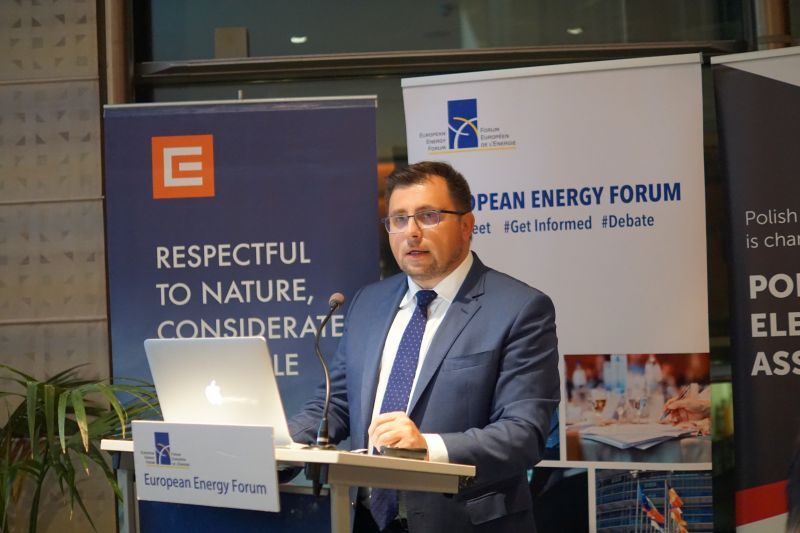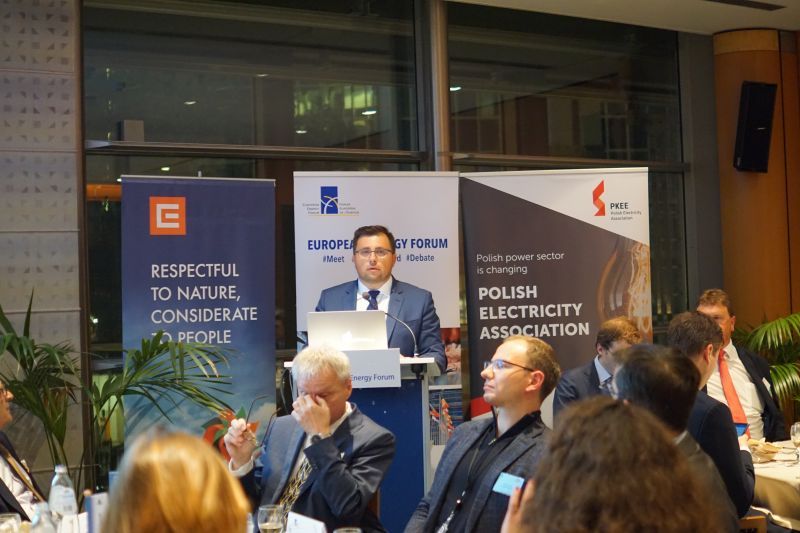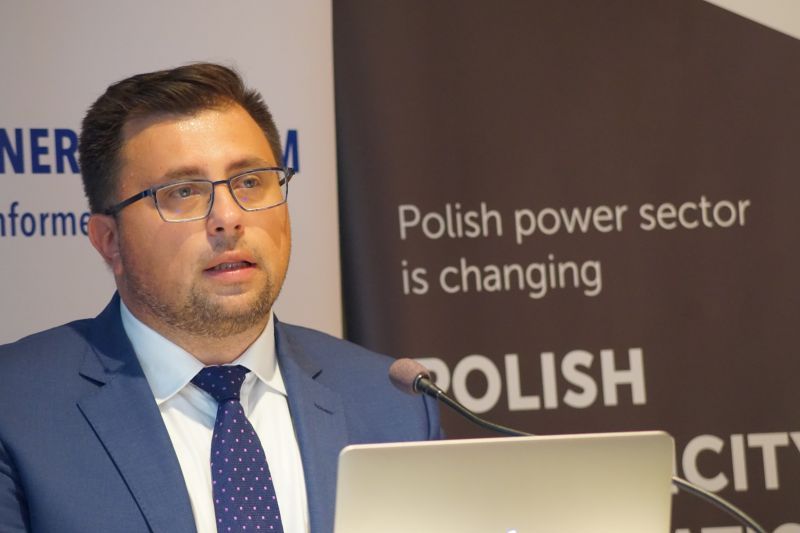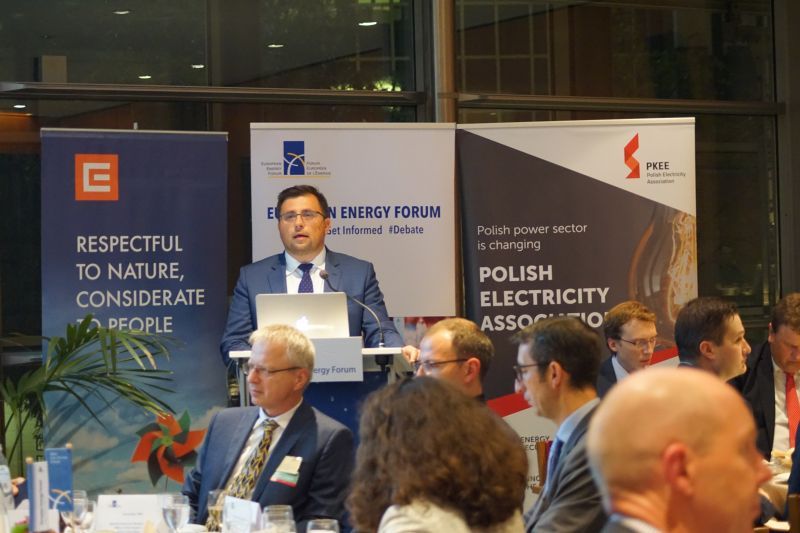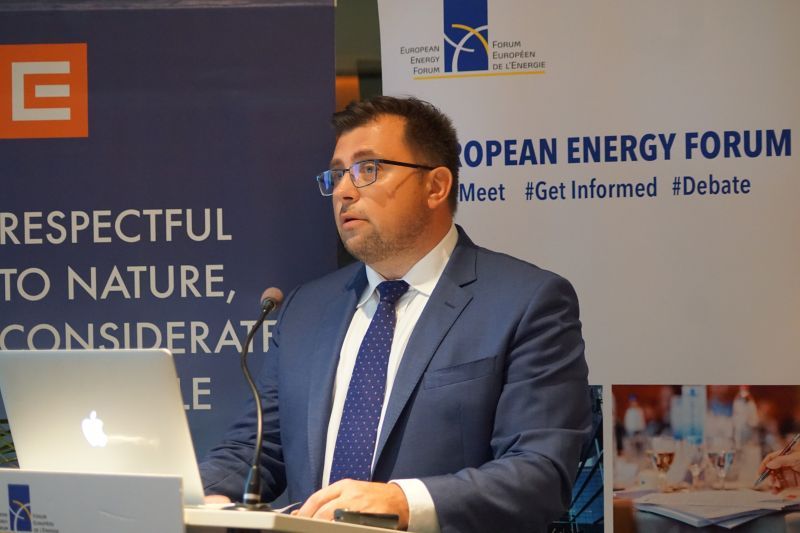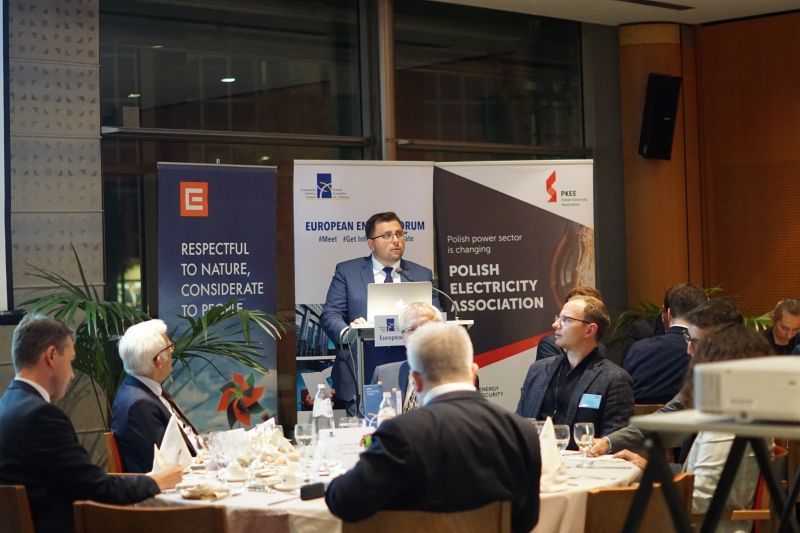Discussing the matters relating to the transformation of the European energy sector until 2050 was the main objective of the debate organised by the European Energy Forum in cooperation with the Polish Electricity Association (PKEE) and ČEZ. The meeting, attended by the European Union officials, Members of the European Parliament and the representatives of energy utility companies took place in Brussels on 16th of October 2019. The transformation of the European energy sector by 2050 is the main objective of the debate organised by the European Energy Forum in cooperation with the Polish Committee for Electricity (PKEE) and ČEZ. The meeting with the participation of European Union officials, members of the European Parliament and company representatives took place on 16 October 2019 in Brussels.
President of the Management Board of TAURON Polska Energia Filip Grzegorczyk, who represented the Polish Electricity Association in his capacity of the Vice-president of the Management Board of the PKEE has stressed that the transformation of Poland’s energy sector is one of the biggest challenges faced at present by the Polish economy. - The energy transition process should be taking place based, first and foremost, on the principles of fairness and solidarity between the Member States of the European Union and individual sectors, so that its costs would not be passed on to the citizens. The European Commission as a follow up of the 2050 long-term strategy should propose a mechanism for sharing the costs and benefits relating to the realisation of the vision of low-emissions EU economy, which would give consideration to the different starting points of the EU Member States – he said. - I wish to highlight that for Poland’s energy sector alone the estimated financial spending, assuming a reduction of emissions by 80 percent, may amount to around EUR 215 billion by 2045, including a EUR 68 billion cost of the CO2 emission allowances - he clarified. The energy transition process should be based above all on the principles of solidarity and justice between EU Member States and individual sectors, so that its costs are not passed on to citizens. The European Commission, following the long-term strategy to 2050, should propose a mechanism for the division of costs and benefits associated with the realisation of the vision of a low-emission EU economy which takes into account the different starting points of EU Member States. - he said. - I would like to remind you that for the Polish energy sector alone, the estimated financial outlays, assuming an 80% reduction in emissions, could amount to some EUR 215 billion by 2045, including EUR 68 billion related to the cost of emission allowances CO2 - he explained.
CEO Grzegorczyk has also pointed out that the members of the PKEE are actively working on combating the climate change effects and already today are following the global trends in the development of renewable energy. He added that Tauron, PGE, Energa and Enea utilities are implementing numerous investments aimed at increasing the share of low-emission sources in their energy mixes. - In May 2019, the Tauron Group has announced an update of its strategic directions – the TAURON’s Green Turn. The document assumes that in the 2025 perspective investments will be completed in, among others, on-shore wind farms – an additional 900 MW, and photovoltaic farms – an additional 300 MW. The implementation of the planned measures will allow increasing the share of low- and zero-emission sources in the Group’s energy mix to nearly 30 percent in 2025 and over 65 percent in 2030 – he stressed. In May 2019. Tauron Group announced an update of the Group's strategic directions - TAURON's Green Turn. The document assumes, in the perspective to 2025, among others, investments in onshore wind farms - additional 900 MW and photovoltaic farms - additional 300 MW. Thanks to the implementation of the planned measures, it will be possible to increase the share of low- and zero-emission sources in the Group's energy mix to nearly 30 per cent in 2025 and over 65 per cent in 2030. - he noted.
The Vice-president of the PKEE has also pointed attention to the need to ensure a stable regulatory environment at the EU level and to the necessity to take into account the social, economic and technological factors in the energy transition process. - There is no doubt that the high ambitions require ensuring relevant funds that will help with effective execution of the transition and that will ensure public acceptance for the planned initiatives. This process requires support for the transitional technologies, which include natural gas, so as to make sure that stable supply of energy to end-users is maintained - he explained. There is no doubt that High ambitions require securing adequate resources to help effectively implement the transformation and ensure social acceptance for the planned initiatives. In this process, it is essential to support transitional technologies, including gas, so that the stability of energy supply to end users can be maintained. he explained.
DOWNLOAD FILES

